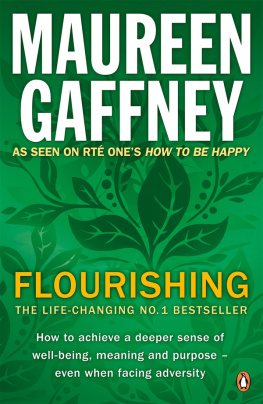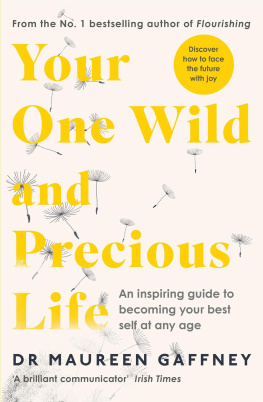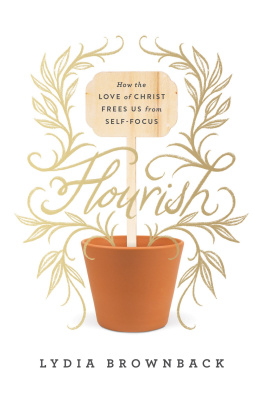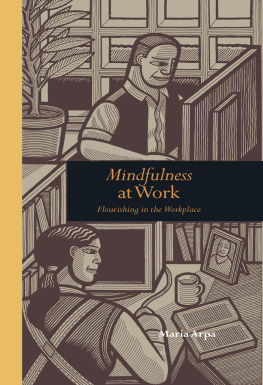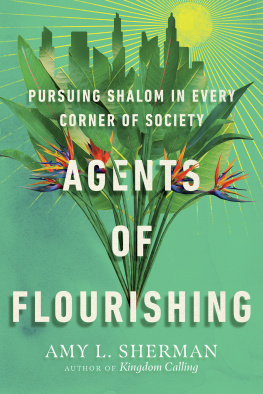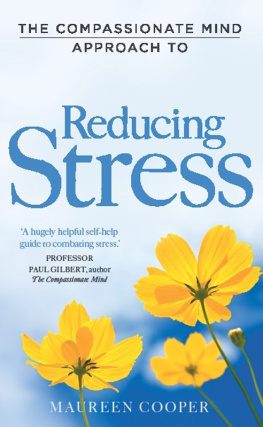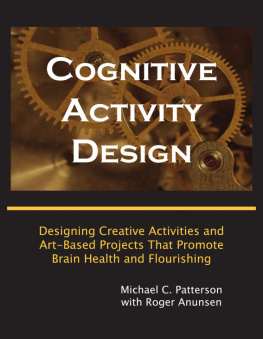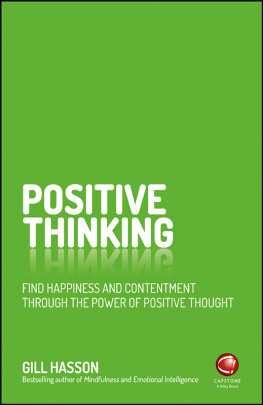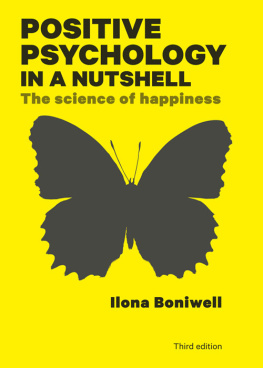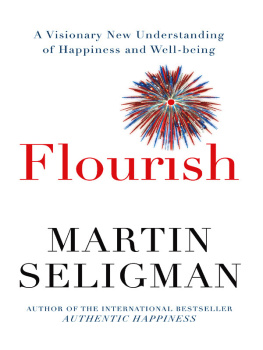
MAUREEN GAFFNEY
Flourishing
How to achieve a deeper sense of well-being, meaning and purpose even when facing adversity

PENGUIN BOOKS
Published by the Penguin Group
Penguin Books Ltd, 80 Strand, London WC2R 0RL , England
Penguin Group (USA) Inc., 375 Hudson Street, New York, New York 10014, USA
Penguin Group (Canada), 90 Eglinton Avenue East, Suite 700, Toronto, Ontario, Canada M4P 2Y3 (a division of Pearson Penguin Canada Inc.)
Penguin Ireland, 25 St Stephens Green, Dublin 2, Ireland (a division of Penguin Books Ltd)
Penguin Group (Australia), 707 Collins Street, Melbourne, Victoria 3008, Australia (a division of Pearson Australia Group Pty Ltd)
Penguin Books India Pvt Ltd, 11 Community Centre, Panchsheel Park, New Delhi 110 017, India
Penguin Group (NZ), 67 Apollo Drive, Rosedale, Auckland 0632, New Zealand (a division of Pearson New Zealand Ltd)
Penguin Books (South Africa) (Pty) Ltd, Block D, Rosebank Office Park, 181 Jan Smuts Avenue, Parktown North, Gauteng 2193, South Africa
Penguin Books Ltd, Registered Offices: 80 Strand, London WC2R 0RL , England
www.penguin.com
First published by Penguin Ireland 2011
Published in Penguin Books 2012
Copyright Maureen Gaffney, 2011
The moral right of the author has been asserted
Cover design: theBookDesigners
All rights reserved
Typeset by Jouve (UK), Milton Keynes
ISBN: 978-0-141-97049-3
PENGUIN BOOKS
FLOURISHING
Dr Maureen Gaffney is an experienced clinical and academic psychologist who headed the graduate studies programme in Trinity College Dublin for many years and is Adjunct Professor of Psychology and Society at University College Dublin. For the last decade she has also worked with businesses internationally, helping to develop programmes on leadership, on emotional intelligence, on gender and diversity, and on building positive organizational cultures. Among her international clients are companies such as Boston Scientific and Intel and she is a member of Harvard Universitys Kennedy School of Government Womens Leadership Board. In addition, an ability to discuss complex psychological research and concepts in ways that are accessible, engaging and relevant to a general audience means that she is a popular newspaper columnist and television and radio guest.
An enduring theme of Maureen Gaffneys work has been the effort to understand what enables people to be at their best, to be resilient in the face of problems and set-backs, and to flourish under fire. Flourishing has grown out of her long-term interests in cutting edge research in psychology everything from long-term studies of marriage (and what these reveal about the factors that make and break relationships) to the discoveries of neuropsychology and the relatively recent field of positive psychology.
She lives in Dublin with her husband, John. They have two grown-up children, Elly and Jack.
For John, Elly and Jack
Introduction
On my desk as I write are a small bowl of snowdrops and a vase filled with sprigs of daphne, a delicate flowering shrub. Both are bursting with life, the sap flowing freely, straining to fill every bud, stretching every leaf, saturating the air with scent, each its own unique blooming self. They are flourishing. Each of us too has the same instinctive urge to grow and thrive, to feel our life energy stretch and fill every corner of our selves, to reach some high point of self-realization. When we manage to do that, we feel happy. We are able to love more fully, do good work and leave the world a better place than we found it. We are flourishing.
For the last hundred years, psychological science has steadily accumulated a great wealth of insight into the human condition. Over the past decade, much of the focus of psychology has changed in a radical way. Instead of the traditional concentration on disorders and dysfunctions, frailties and weaknesses, psychologists have begun to pay much more attention to what helps us to flourish.
What makes us happy?
What enables us to love and to work in a more successful and fulfilling way?
What helps us to cope with the inevitable problems and frustrations we face, and to bounce back from adversity?
The result has been an outpouring of research on the positive aspects of human functioning, a positivity that is deeply rooted in the science of how the brain works, in how we think and interpret things, in how emotion affects us and how we interact with each other.
While we are beginning to understand what makes us flourish, we are developing a greater understanding of the power of the negative. A sobering body of evidence is showing that negative emotions, and the patterns of thoughts and behaviour they trigger, are far more powerful, contaminating and contagious, and their long-term effects considerably more troublesome, than we once suspected. Of course, we know that anger, personal attack, betrayal, contempt and destructive behaviour hurt. But we routinely underestimate their negative impact on ourselves, on relationships and on organizations. We think that these unpleasant effects will disappear.
Sometimes they do.
But not nearly as quickly and completely as we think.
In many ways, our current attitude to negativity is rather like our attitude to pollution before the green revolution. Not so long ago, we thought we could chuck any old rubbish into the air, the ground and the rivers and oceans, and that somehow it would just disappear. Now we know differently. We know that every bit of pollution counts and it comes right back to us. And when the levels become toxic, pollution can destroy whole ecosystems.
So too with negativity.
It counts.
Like pollution, it can undermine or even destroy the delicate psychological ecosystems in our selves, in our relationships, in the organizations we work in and the communities where we live.
That is not to say that we can, or should, eliminate all negativity from our lives. Unless we feel fear, we cant protect ourselves from harm. Unless we feel anger, we wont fight injustice or protect what we value. Without the capacity for sadness and longing, we cant know the power of love. So how do we find the right balance between the positive and negative in our lives? Is there even such a thing as the right balance?
The answer is yes, and that balance is astonishingly precise.
Moreover, the positivenegative ratio in the way we feel, think and behave is what determines whether we flourish or languish in life, and also whether our relationships and the organizations we work in flourish. When we achieve the right ratio, it initiates an upward virtuous spiral. When the ratio is wrong, we are tipped into a downward vicious cycle and we languish, unable to fulfil our potential. This is when we become depressed, when relationships begin to flounder, and when organizations become dysfunctional.
The discovery of this ratio is one of the most important and far-reaching developments in the social sciences for decades. It has implications for how we live our lives, for how we manage our relationships, for how we work in teams and organizations and, indeed, for how we run our society. It means we need to develop a whole new way of thinking about negativity. Far from dismissing it or wishing it away, we have to do the opposite accord it its full respect. Only then can we see how vital it is to keep our level of positivity so high, in order to balance the much stronger force of negativity. But even when the negative increases exponentially in our lives when we are faced with great adversity, when we are angry, disappointed, worried and afraid of the future once we ramp up the positivity so that we maintain the right ratio between the two, we can still flourish.
Next page
